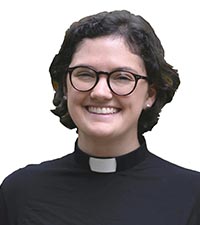
Rev.Alexandra Mauney
Sid & Cathy Batts Pastoral Resident
A couple weeks ago, before we knew how COVID-19 would soon affect our lives, I attended one of the Lenten yoga classes with the youth small groups here at FPC.
I walked to the church from my apartment, yoga mat tucked under my arm, and wondered what the evening would be like. I’ve done some yoga at the YMCA over the years, but I figured this might feel different.
Instead of the usual after-work gym crowd, there’d be giggly teenagers. Instead of the mirrored workout studio, we’d be in the Virginia Gilmer Room. Instead of a roomful of (mostly) strangers, I’d be with members of our faith community.
A deeper experience
I was pretty sure that these differences would amount to a feeling that I was mostly just hanging out on an exercise mat at church, rather than actually doing yoga.
I was wrong.
Sure, there was some giggling – yoga poses can look hilarious, and laughter is good. But overall, the experience felt far richer than yoga classes at the Y or at the local yoga studio.
The instructor (our member Nathan Vercaemert) grounded the practice in Christian language, inviting us to focus on the day’s Lenten intention. The movement was familiar to some but not to all, which created a lovely atmosphere of mutual learning.
Deep breaths
But most of all, that half hour of yoga did for us what yoga often does: It reminded us of our breath.
Breathing is so commonplace, so natural, that we rarely tune into it. Yoga forced us to do just that, paying attention to our inhales and our exhales, noticing what happens in our bodies when we breathe deeply.
This was a gift.
The breath of God
In the Old Testament, there’s this beautiful Hebrew word, ruach, which can mean both “breath” and “spirit.”
- Ruach is the word that’s used in Genesis 8 when God causes a great wind to blow over the earth and make the flood subside.
- We encounter ruach in the valley of dry bones in Ezekiel 37, when God breathes life into the bones.
- It’s ruach that God sweeps over the face of the waters when creation is formed in Genesis 1.
- It’s ruach that’s poured out when Wisdom makes her words known to us in Proverbs 1.
This one Hebrew word encompasses so much of God’s activity in the world, and I love how broad its meaning can be.
At yoga with the youth small groups a couple weeks ago, we learned something of God’s ruach. We paid attention to the movement of God’s spirit – God’s very breath! – and I think many of us went home with a deepened sense of God’s presence in our lives.
Mercy in, mercy out
Presbyterian Christian educator Rodger Nishioka often begins keynote talks or sermons with a breath exercise. I invite you to give it a try, right now, wherever you are with your phone or computer or tablet.
Pay attention to your breath. When you inhale, recite these words in your head: “Breathe in God’s mercies.”
When you exhale, recite these words in your head: “Breathe out God’s mercies to others.”
Do this several times.
Do you feel grounded? Do you feel how God’s ruach is present in the world around you? I invite you to take this exercise with you into the coming days and weeks, as we continue to live into this strange wilderness time.
God’s breath is among us, even as we are apart. Peace be with you.
